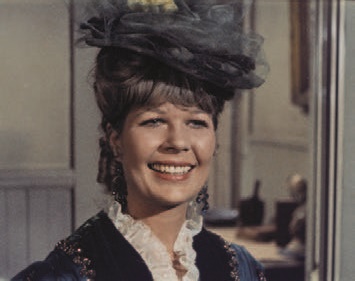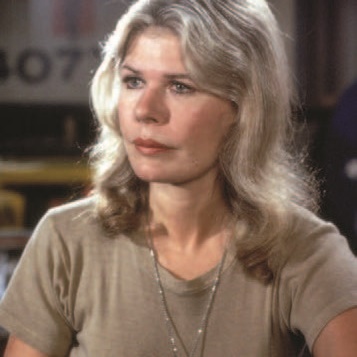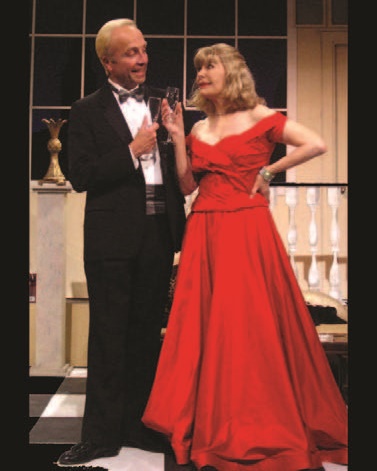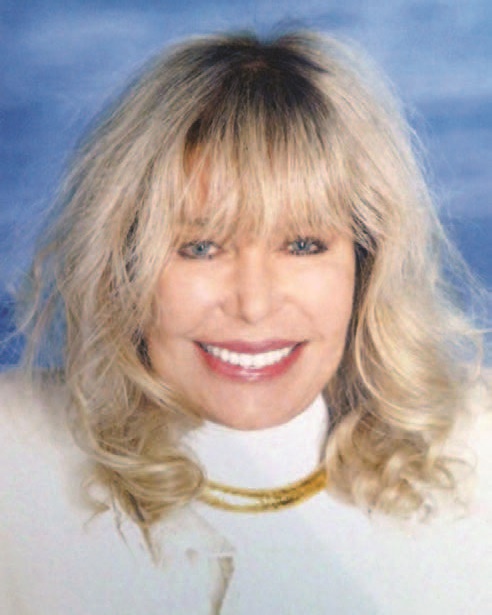Honesty, strength, generosity, and humor are qualities we look for in the people we admire and trust. They also happen to be the attributes that define Loretta Swit. After honing her craft on the stage for more than a decade, she was discovered by West Coast television producers and landed the role of Major Margaret Houlihan on the hit series M*A*S*H*—for which she would win a pair of Emmys—and then fought to give her character purpose and depth far beyond anything the show’s creators had imagined. A gifted child performer, Swit followed her dream across the river to New York and then across the country to Hollywood. As Gerry Strauss discovered, Loretta’s success was no accident, and her vision extends far beyond her role as an entertainer.
EDGE: What do you view as the qualities that took you to Hollywood?
LS: I would put courage number one. And confidence in my ability—my lust, if you will—to perform. Also, I was surrounded by some really lovely, talented teachers, and people who guided me and gave me support that fueled that confidence. Nobody in my environment made it to Hollywood, period. To announce you’re going to go into the theater was, like, no way. I’ve said in other interviews that I had no choice, that it came from the heart. But I’ve also come around to accept what other people [have called courage]. I think that it’s okay to know how brave you are, or how strong you can be. I think that’s a positive thing to know about yourself.
EDGE: Would you follow the same path from New Jersey to New York to L.A. if you were starting today?
LS: No. I don’t think I would have gone to California. Susan Taylor, my adorable and fun friend once said. “Don’t ever go to Hollywood without a contract in your hand. It’s a tough town.” I think that’s good advice.
EDGE: But you did, didn’t you?
LS: I always thought my career was on the stage. I never thought of myself as a film actress. But yes, a friend of mine, with whom I had done a play and who lived in California said, “Why don’t you come here for a week or two…and just, you know, spent a few weeks here? You never know. You might meet somebody who’d see you and says, Hey. you’d be right for this part.“ So I wound up at the office of the casting director for all of CBS—a very important lady, Pam Polifroni—and she was looking through my book and she said, “I know you. I know your name.” I insisted that she didn’t know me—I was a nobody! “Wait a minute,” she said, “there was an agent in here raving about your work. He went on and on about how good you were, and it impressed me.” She said his name was Fred Amsel and he was very laid-back and not at all pushy, even for his clients—and that he was so excited about me, even though I wasn’t a client. She promised to keep me in mind if something came up. I said, “I don’t live here.” She said, “Well, you never know.”

CBS Productions
EDGE: Did you call the agent?
LS: I did. I called him and he was a real Damon Runyon character. I don’t think he ever called me anything but “Kid.” We had lunch, he told me that in his agency he covered CBS and Paramount and that he would be happy to represent me. “If you’re willing to take a chance, I will get out there and talk about you in the district that I represent.” And it so happened that a part came up on Gunsmoke (left), which was CBS, which of course Pam cast. And so Fred called her and he said, “How about if I put Loretta for this part?” She said, “I think she’ll be very good in it.” I had to [audition] with some other people but I got the role. Fred called and said, “We got lucky!” I said, “I know. It’s great. It’s wonderful.” And it was a wonderful role and just a fabulous time. And a great beginning, because in those days, you really needed to have film on yourself to show people.
EDGE: What did the road from Gunsmoke to M*A*S*H* look like?

CBS Productions
LS: I was still filming Gunsmoke when they sent me over to Paramount to read for Mannix, which turned into my second job on television. Fred said, “We got lucky, again!” At that point, the three other agents in his office said, “This is looking very good. Let’s sign her.” And so I went with that office. Anyway, I was in Hawaii doing Hawaii Five-0—it was a gorgeous job—and Fred called and asked if I had seen the movie M*A*S*H* and I hadn’t. “Oh,” he said, “well, okay, terrific, it doesn’t matter, nevermind. You have a meeting with Gene [Reynolds] and Larry [Gelbart]. It’s just on you. There’s no script to read. So just go in, they’re gonna look you over, see if you’re what they have in mind for the part.” So, needless to say, I had no nerves. I was going to meet these lovely people. I didn’t know what I was about to lose or gain. I met my girlfriend before I went to the meeting and we went shopping and had a lot of laughs. In the meantime, Fred had an offer for me for a movie with Olivia de Havilland, and I was in disbelief. “The only thing is the dates of the filming conflict with the pilot for M*A*S*H*,” he said. “You can’t do both. However, this is an offer.” He said he would call [Gene and Larry] and tell them politely that, if they had decided on me, they have to move now. Gene Reynolds took the call, and said, “Nope, don’t give her away. She’s ours. We’ve just decided to go with Loretta.”
EDGE: Margaret Houlihan was a very complex character for a comedy series. Did you have any idea of where you wanted her to go in those early episodes?
LS: I was not the happiest of campers the first two or three seasons. I felt they were writing Margaret right but at the same time, she was entangled in a relationship with Frank Burns that was just beneath her. My character worshiped doctors and they were writing Larry [Linville] like a joke. Of course, he was so brilliant and funny and wonderful in that role, they weren’t going to change that. It was a given to keep Larry on that train. Alan [Alda] said it best: “As a writer, when you get a wonderful gimmick that’s working, that’s giving you all you want, like Frank Burns and Houlihan—who were funny and ridiculous and marvelous—it’s difficult for the writer to let go.” We’ve got a winner here. Don’t tamper with it. If it’s not broken, don’t try to fix it. In the meantime, my character was being assassinated.
EDGE: How did you advocate for Margaret?
LS: In the beginning years, when I didn’t know we would go for 11 seasons, I would talk to Gene Reynolds and he would say, “It’s episodic, sweetheart.” I’d say, “Yeah, but I feel like I’m going back and forth. In one episode, I see what an idiot Frank is, and you helped me with a line. But in the next episode, it’s like nothing ever happened. I haven’t learned anything…my character is not allowed to continue to grow and it’s making me crazy.” Little by little, Gene and the writers tried to talk to me. The guys were writing for the guys at that point and the guys were writing for Margaret, too. Gelbart was very, very aware of what was lacking in the first season. He said, “Hang in with us, we’re working on where she’s going.” In year two, I think, they had the wonderful idea to hire two women to write a revealing episode for Margaret. But again, in the following episode—no, no, no!—it’s like it didn’t happen. I kept plaguing them for help. Finally, I was in New York doing a play on a hiatus and the boys got together and we had a conference call, during which we ripped everything apart. They asked, “What do you see? Where is she going? What do you see for the next season coming up?”

Photo courtesy of Loretta Swit
EDGE: What was your answer?
LS: She’s got to break up with Frank.
EDGE: Wow.
LS: “She’s got to leave him,” I said. “She’s got to go to Tokyo and meet somebody dashing and wonderful. I don’t care if he’s goofy and funny— because they have to be—but he doesn’t have to be a doctor. And he can outrank Frank, because that’s very important to Margaret.” They asked, then what? And Gene said, “Let’s get her engaged.” So we had this incredibly creative, wonderful, funny conversation where Margaret gets married and then finds he’s been disloyal and then gets divorced. There were a lot of good tracks to cover in those ideas, which we did. We really worked together like a well-oiled machine—everybody on this show worked together with the writers. Those Mondays were like fireworks. You had these creative people, throwing ideas back and forth in positive, wonderful, rich ways. It was a very exciting time to be around, to be an actor in that situation. You could not help but get better and grow and learn. It was just tremendous.
EDGE: Major Houlihan changed the way a lot of people looked at nursing during that era. Was that something you were aware of during the series?
LS: I don’t think so. It was only in retrospect that I see how strong the effect was. So many people have told me they became nurses because of me, because of Margaret. Television is so powerful. It can do so much good. It’s amazing. When we began, I said to Gene, “I want to play her like the best damn nurse in Korea. That’s what she wants to be and that’s what she is.” Again, you see how that played into my fight to get away from Frank Burns and the relationship, which in a way degraded her. He was an incompetent doctor, and so what was she doing there, when staying in that relationship any longer made it impossible for me to be the best damn nurse in Korea? I feel from that moment on, Margaret started to blossom and grow. She was flawed, like we are all flawed, but she’s a great example for nurses, for a head nurse and for the military.
EDGE: Obviously, M*A*S*H* also changed how doctors were portrayed.
LS: It did. You know, up until M*A*S*H* the doctors on television didn’t lose patients. They always pulled them through. That’s nice, but it’s not honest. We used to say that M*A*S*H* is not a John Wayne movie about war. In our series, people died, patients died, people got wounded and hurt. And we never stop talking about the ugliness of it. The humor came out of our own madness and craziness to have to be there to do that. The only way to survive was by being crazy and funny and drunk. I think M*A*S*H* took on cult status because we told everybody the truth.
Animal Alliance

www.istockphoto.com
Loretta Swit has leveraged her success and fame to the great benefit of myriad causes, from battling homelessness to advocating for emergency medicine to animal rights. She also devoted two months of her life to the recovery efforts after 9/11. Her charity, the SwitHeart Animal Alliance (switheart.org), promotes and cooperates with nonprofits dedicated to protecting, rescuing, training and caring for animals and preserving their habitats.
“The operative word is alliance,” she says. “There are a lot of wonderful people out there who are on the same page doing good. We’ve been very successful working together. For example, Mission Canine just brought back nine dogs from Kuwait with PTSD and we’ll be taking care of them at our camp in Houston. We’re also working with shelters to train service dogs, and search and rescue dogs, which can be deployed to disaster areas all over the world. We kind of cover every sphere—the aim is to get all of these people working together toward the same purpose and goals, to make some changes and to make a difference in a very positive way. They’re all incredible people.”





